03 -The Natural Hair Journey – Is Discrimination Based on Hair Texture Real? – Oshun Afrique Interview
Fetch error
Hmmm there seems to be a problem fetching this series right now.
Last successful fetch was on January 26, 2024 14:36 (
What now? This series will be checked again in the next hour. If you believe it should be working, please verify the publisher's feed link below is valid and includes actual episode links. You can contact support to request the feed be immediately fetched.
Manage episode 239953690 series 2532420
The Natural Hair Journey
Now more than ever we see black women wearing their hair curly and chemically unaltered. Black women are embracing the way their hair naturally grows regardless of texture, length, or curl pattern. On today’s episode of OEL the ladies and their special guest discuss the natural hair journey and the discrimination that some face.
Black women are rejecting standard beauty ideals to embrace natural styles, black hair continues to be regulated and restricted in many areas of American society. Narrow beauty standards make it difficult for women to freely celebrate their own beauty. Black women are unfairly impacted. Society’s bias has enabled discrimination against Black women’s hair, including being judged differently based on hair texture and hairstyle.
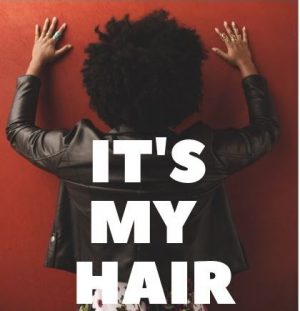
Natural Hair Expert: Oshun Afrique
In the episode we interview Oshun Afrique, teacher, natural hair stylist and community influencer. Oshun is known for providing professional hair care to the Greater Washington D.C. and Philadelphia Metropolitan areas for nearly 2 decades. She teaches Black women healthy hair practices for their specific hair needs. Oshun is a natural hair facilitator and educator who also creates African-Centered adornments for today’s AUDACIOUS Woman. And finally, she’s known for ensuring a relaxing, comfortable, and professional experience with each and every visit. 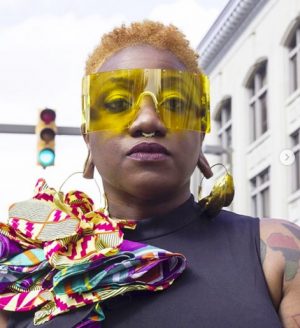
Oshun began her natural hair own journey in 1998. She began to transition her hair and had her last perm in 1998. In 1999 she did “the big chop” and started helping college classmates on their natural hair journey. She started with an Afro, then moved to twists and finally she began wearing locs. Images of women in and around her community with natural hair made the transition process easy for Oshun.
Our hosts discussed the “big chop” and asked if everyone needs to do it. Oshun stated big chops aren’t necessary and it also depends on what kind of styles they’re looking for. If a person wants their hair to grow in healthy, a big chop is the best way to go. The big chop can be a shock to the system and aesthetically as some women have a fear of what the regrowth process will do to their self-esteem says Oshun. Oshun recommends the big chop, and noted that she has experienced stylists in her salon that can assist with the transition if the big chop is not for them. She noted that there is a culture shift and women are becoming more and more comfortable with wearing their own hair.
The ladies spoke on their natural hair journey and how they started the process. Chelsea Jade added how she did the big chop not once, but twice and it worked for her and the other host Monique Knows transitioned by wearing wigs and weaves. They all agreed that going natural has been a learning experience.
For some, going natural is a great choice compared to the years of fried and flat looking hair. When the hair is flat-ironed or permed it can sometimes look stiff and often have an odor. Some women still perm their edges even though they consider themselves natural. Women should keep their hair moisturized and not put too much stress on the hair says Oshun. It’s better to keep a routine using the same products that will keep the hair feeling and looking good.
Some common or popular hairstyles for natural hair are Cuban or Marley twists, and Flat Twists with added hair. There should be a healthy balance between wearing wigs and weaves depending on your lifestyle. She understands why women choose alternative hairstyles, stating its due to their busy lifestyle. Active lifestyles versus a sedentary lifestyle require different levels of upkeep to the hair. There are benefits to any hair type. It’s been said that “we always want what we can’t have” meaning women often look and compare their hair and hair styles to that of other women. Oshun shows her clients their hair’s potential. She also notes that some women make decisions about their hair based off of the opinions of men. Her clients often mention styles that their husbands and boyfriends like, but doesn’t take it into consideration as she believes women should have the final say over their hair.
Oshun shared the importance of maintaining the hair and keeping it moisturized, wash and cover your hair and if you don’t maintain it, the hair can become damaged and will fall out. She also stated how women need to make sure that stylist are practicing techniques that will help protect their edges. Experienced stylists know the importance of keeping clients informed and offer techniques on how to properly manage their hair.
Common foods found in your home can help your hair to stay moisturized such as, healthy fats, vegetable fats, including eggs, egg yolks, avocado, rosemary, almond oil. She said to use no more than 5 ingredients and to not be a “product junkie” spending money on unnecessary products. Oshun often recommends that her clients see dermatologists if they’re having issues with their hair, especially if the skin is inflamed or have a lot of buildup on the scalp.
Some of the product tips that Oshun shared were to use tea tree and eucalyptus shampoo, extra moisturizing shampoo, conditioning and a cold rinse. Constant moisturizing and covering your hair will protect it from damaging. Washing hair with cold water can shrink your pores and it closes the cuticles in your hair says Oshun.
The Natural Lifestyle
Black women choose to go natural for a number of reasons, many of which reflect the woman’s discovery of her natural beauty or ability to make independent lifestyle choices. One of the original motivations of the early natural hair movement was to lead a healthier, more resource-conscious lifestyle.
It’s become common knowledge that relaxers cause serious damage, including itching, inflammation, broken hairs, burns, and even hair loss. With studies linking relaxer usage to health risks like uterine fibroids, heart disease, hair loss, scalp damage, chemical imbalance, cancer, and early puberty, more and more women sought alternatives to their century old beauty secret. Going natural is a great option for those who can do it. 
Stress may cause women to shed hair more often, but at Oshun’s salon (The River Oshun), they always encourage a healthy lifestyle. Lack of self-care, stress and diet can impact hair and the rest of your body. Maintaining a healthy lifestyle can help the hair stay healthy. What happens in our bodies can affect our hair and staying healthy can stop the hair from falling out.
This new enthusiasm for natural hair comes at the same time as the major rise in organic products for hair care. Women who wear their hair natural are now spending more money on products that will provide the best result for their hair. In choosing what products to use, black women rely heavily on social media to gauge results from others who have gone natural. They have done this by the use of YouTube videos as tutorials on how to use products efficiently and create reviews for consumers to watch.
Hair is a very big deal in the black community. The ladies of OEL asked if other races that are inquiring about their hair as often as black women. She informed that her salon is located in a fairly diverse area, and is mainly for black hair care but there are other races of women who want to become clients. Asian, Caucasian, and Middle-Eastern women have come into her salon and inquired about products and services that she offers. Though she caters mainly to black women, she’s noticed that some Caucasian women expressed interest in locs.
Women going natural should try to keep a balance between protective styles and natural hairstyles. When the hair is in a protective style there needs to be no tension and the scalp and hair needs to be moisturized. Washing the hair with witch hazel can keep the scalp clean, this is an alternative to not using shampoo. A dirty scalp can smell bad, breed bacteria, and cause break outs to happen.
For many black women, the natural hair movement signifies much more than just cultural pride. It signifies an attempt at a healthier lifestyle, a more authentic existence, and a redefinition of the meaning of beauty.
Perceptions of Natural Hair

Our perceptions of natural hair stem largely from visual processes, and as a result, our brains’ repeated exposure to smooth and silky hair linked to beauty, popularity, and wealth creates associations that smooth and silky hair is the beauty default.
Some women believe they need a perm because they’ve always had one. There are some who don’t actually know what their real hair looks like. There is a lot of fear that keeps women from making the transition simply because they don’t know what it’ll look like. They might opt for wigs or weaves to keep it covered until the transition is complete. Hair bias against natural or textured hair has a distinct impact on black women for whom textured hair is their “normal.”
Maintenance and upkeep might also keep women from going natural. Some don’t feel comfortable with the way their hair looks. Many aren’t willing to take the time to learn about their natural hair or what it’s like. This process requires patience and education on proper hair maintenance to know what natural hair requires.
The perception is that in order to look nice, a black woman’s hair has to be straight. It becomes a notion that straight hair is nicer hairr. Oshun’s goal is to educate young girls and show them why perceptions are just that. Black women in the natural hair community have significantly more positive attitudes toward textured hair than other women. For the first time in history, black women are allowed to be their true physical selves in society and have worked together to encourage each other to make the transition, in many ways, into liberation from the limitations of beauty.
There’s also a myth that having straight hair is more professional. Even locs can be deemed unprofessional and sometimes Black women might shy away from certain hair styles because of how they may be perceived. Some women are uncomfortable with their hair. Oshun shared how women have to choose between conforming to workplace standards and adhering to policies and procedures and being free to wear their natural hair. In 2019 Black women still remain pressured to conform to “the normal” standards of appearance.
The Streets are talking
The ladies of OEL took to Instagram to ask to ask men are you attracted to certain hair types?

Skip to: 16:24 Listen to the Responses to our poll ” Are you attracted to a certain hair types“
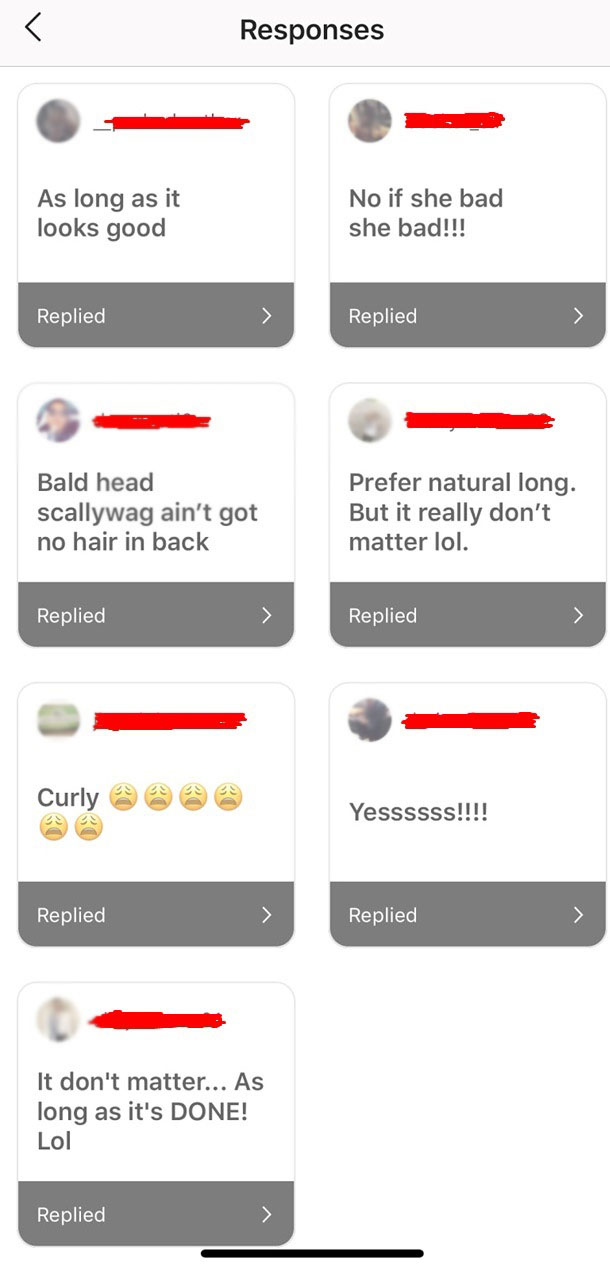
It’s believed they like the longer hair. They answered with liking long hair as long as it looks good, natural | long, and curly.
Chelsea Jade ask women on IG what are some of the reasons you wear wigs and weaves?
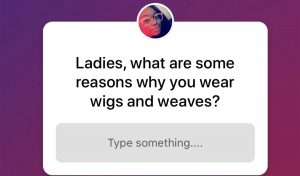
Skip to: 15:47 Listen to the Poll Responses ” Why some women wear Wigs and Weaves“
Some of the answers were comprised of liking to switch up the looks, it’s easier, laziness, they think they look bald, and why not?
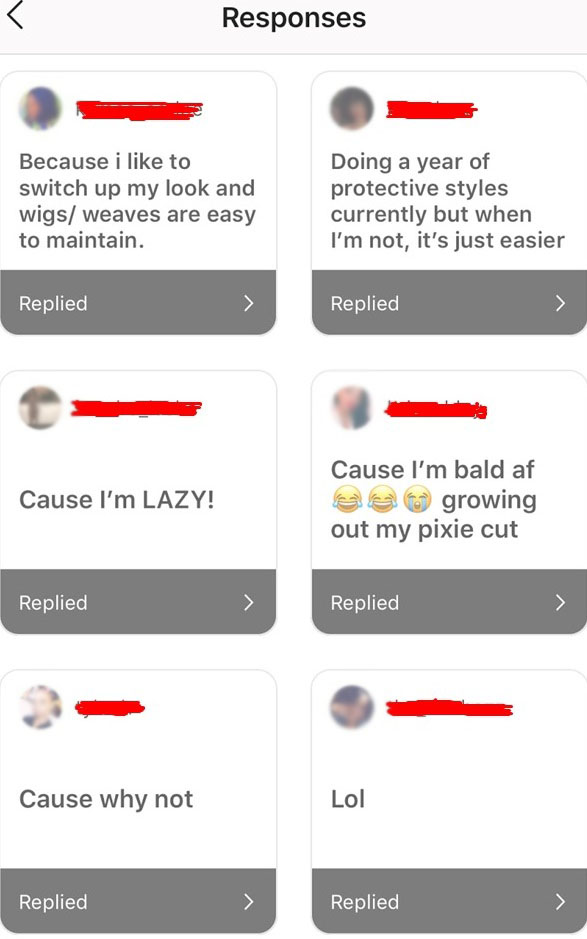
Lindsey J on Instagram asked if men mind when women wrap their hair at night, or is it a turn off. Most responses from men noted that they don’t seem to mind.
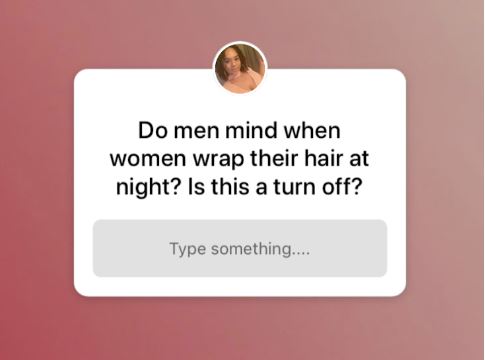
Skip to: 18:00 Listen to the Poll Responses ” Do men mind when women wrap their hair at night“

Key Takeaways from This Episode
-
Learn more about Oshun Afrique on her website.
-
Connect with Oshun on her Instagram Account & Facebook Page.
-
Your health and lifestyle greatly impacts your hair
-
Education and patience is a must when starting the natural hair transition
-
Household organic products can be used as a moisturizers
-
Black women still remain pressured to conform to “the normal” standards of appearance.
-
There are benefits to whatever type of hair that you have
Where to subscribe: iTunes/Apple Podcast | Android | Google Podcasts | Google Play | Stitcher | TuneIn | Spotify | RSS
Help Us Spread the Word! Please let your Twitter followers know about this podcast. Simply click here now to post a tweet.
Have an idea for an interview reach out: Podcast@OELShow.com
Got a show idea, or a suggestion Leave a Voice Mail: 571-206-8292
If you enjoyed this episode of the On Everyone’s Lips (OEL Show) podcast, please head over to iTunes, leave a rating, write a review, and subscribe. And if you listen on Stitcher, please click here to rate and review this show.
The Natural Hair Journey
Now more than ever we see black women wearing their hair curly and chemically unaltered. Black women are embracing the way their hair naturally grows regardless of texture, length, or curl pattern. On today’s episode of OEL the ladies and their special guest discuss the natural hair journey and the discrimination that some face.
Black women are rejecting standard beauty ideals to embrace natural styles, black hair continues to be regulated and restricted in many areas of American society. Narrow beauty standards make it difficult for women to freely celebrate their own beauty. Black women are unfairly impacted. Society’s bias has enabled discrimination against Black women’s hair, including being judged differently based on hair texture and hairstyle.

Natural Hair Expert: Oshun Afrique
In the episode we interview Oshun Afrique, teacher, natural hair stylist and community influencer. Oshun is known for providing professional hair care to the Greater Washington D.C. and Philadelphia Metropolitan areas for nearly 2 decades. She teaches Black women healthy hair practices for their specific hair needs. Oshun is a natural hair facilitator and educator who also creates African-Centered adornments for today’s AUDACIOUS Woman. And finally, she’s known for ensuring a relaxing, comfortable, and professional experience with each and every visit. 
Oshun began her natural hair own journey in 1998. She began to transition her hair and had her last perm in 1998. In 1999 she did “the big chop” and started helping college classmates on their natural hair journey. She started with an Afro, then moved to twists and finally she began wearing locs. Images of women in and around her community with natural hair made the transition process easy for Oshun.
Our hosts discussed the “big chop” and asked if everyone needs to do it. Oshun stated big chops aren’t necessary and it also depends on what kind of styles they’re looking for. If a person wants their hair to grow in healthy, a big chop is the best way to go. The big chop can be a shock to the system and aesthetically as some women have a fear of what the regrowth process will do to their self-esteem says Oshun. Oshun recommends the big chop, and noted that she has experienced stylists in her salon that can assist with the transition if the big chop is not for them. She noted that there is a culture shift and women are becoming more and more comfortable with wearing their own hair.
The ladies spoke on their natural hair journey and how they started the process. Chelsea Jade added how she did the big chop not once, but twice and it worked for her and the other host Monique Knows transitioned by wearing wigs and weaves. They all agreed that going natural has been a learning experience.
For some, going natural is a great choice compared to the years of fried and flat looking hair. When the hair is flat-ironed or permed it can sometimes look stiff and often have an odor. Some women still perm their edges even though they consider themselves natural. Women should keep their hair moisturized and not put too much stress on the hair says Oshun. It’s better to keep a routine using the same products that will keep the hair feeling and looking good.
Some common or popular hairstyles for natural hair are Cuban or Marley twists, and Flat Twists with added hair. There should be a healthy balance between wearing wigs and weaves depending on your lifestyle. She understands why women choose alternative hairstyles, stating its due to their busy lifestyle. Active lifestyles versus a sedentary lifestyle require different levels of upkeep to the hair. There are benefits to any hair type. It’s been said that “we always want what we can’t have” meaning women often look and compare their hair and hair styles to that of other women. Oshun shows her clients their hair’s potential. She also notes that some women make decisions about their hair based off of the opinions of men. Her clients often mention styles that their husbands and boyfriends like, but doesn’t take it into consideration as she believes women should have the final say over their hair.
Oshun shared the importance of maintaining the hair and keeping it moisturized, wash and cover your hair and if you don’t maintain it, the hair can become damaged and will fall out. She also stated how women need to make sure that stylist are practicing techniques that will help protect their edges. Experienced stylists know the importance of keeping clients informed and offer techniques on how to properly manage their hair.
Common foods found in your home can help your hair to stay moisturized such as, healthy fats, vegetable fats, including eggs, egg yolks, avocado, rosemary, almond oil. She said to use no more than 5 ingredients and to not be a “product junkie” spending money on unnecessary products. Oshun often recommends that her clients see dermatologists if they’re having issues with their hair, especially if the skin is inflamed or have a lot of buildup on the scalp.
Some of the product tips that Oshun shared were to use tea tree and eucalyptus shampoo, extra moisturizing shampoo, conditioning and a cold rinse. Constant moisturizing and covering your hair will protect it from damaging. Washing hair with cold water can shrink your pores and it closes the cuticles in your hair says Oshun.
The Natural Lifestyle
Black women choose to go natural for a number of reasons, many of which reflect the woman’s discovery of her natural beauty or ability to make independent lifestyle choices. One of the original motivations of the early natural hair movement was to lead a healthier, more resource-conscious lifestyle.
It’s become common knowledge that relaxers cause serious damage, including itching, inflammation, broken hairs, burns, and even hair loss. With studies linking relaxer usage to health risks like uterine fibroids, heart disease, hair loss, scalp damage, chemical imbalance, cancer, and early puberty, more and more women sought alternatives to their century old beauty secret. Going natural is a great option for those who can do it. 
Stress may cause women to shed hair more often, but at Oshun’s salon (The River Oshun), they always encourage a healthy lifestyle. Lack of self-care, stress and diet can impact hair and the rest of your body. Maintaining a healthy lifestyle can help the hair stay healthy. What happens in our bodies can affect our hair and staying healthy can stop the hair from falling out.
This new enthusiasm for natural hair comes at the same time as the major rise in organic products for hair care. Women who wear their hair natural are now spending more money on products that will provide the best result for their hair. In choosing what products to use, black women rely heavily on social media to gauge results from others who have gone natural. They have done this by the use of YouTube videos as tutorials on how to use products efficiently and create reviews for consumers to watch.
Hair is a very big deal in the black community. The ladies of OEL asked if other races that are inquiring about their hair as often as black women. She informed that her salon is located in a fairly diverse area, and is mainly for black hair care but there are other races of women who want to become clients. Asian, Caucasian, and Middle-Eastern women have come into her salon and inquired about products and services that she offers. Though she caters mainly to black women, she’s noticed that some Caucasian women expressed interest in locs.
Women going natural should try to keep a balance between protective styles and natural hairstyles. When the hair is in a protective style there needs to be no tension and the scalp and hair needs to be moisturized. Washing the hair with witch hazel can keep the scalp clean, this is an alternative to not using shampoo. A dirty scalp can smell bad, breed bacteria, and cause break outs to happen.
For many black women, the natural hair movement signifies much more than just cultural pride. It signifies an attempt at a healthier lifestyle, a more authentic existence, and a redefinition of the meaning of beauty.
Perceptions of Natural Hair

Our perceptions of natural hair stem largely from visual processes, and as a result, our brains’ repeated exposure to smooth and silky hair linked to beauty, popularity, and wealth creates associations that smooth and silky hair is the beauty default.
Some women believe they need a perm because they’ve always had one. There are some who don’t actually know what their real hair looks like. There is a lot of fear that keeps women from making the transition simply because they don’t know what it’ll look like. They might opt for wigs or weaves to keep it covered until the transition is complete. Hair bias against natural or textured hair has a distinct impact on black women for whom textured hair is their “normal.”
Maintenance and upkeep might also keep women from going natural. Some don’t feel comfortable with the way their hair looks. Many aren’t willing to take the time to learn about their natural hair or what it’s like. This process requires patience and education on proper hair maintenance to know what natural hair requires.
The perception is that in order to look nice, a black woman’s hair has to be straight. It becomes a notion that straight hair is nicer hairr. Oshun’s goal is to educate young girls and show them why perceptions are just that. Black women in the natural hair community have significantly more positive attitudes toward textured hair than other women. For the first time in history, black women are allowed to be their true physical selves in society and have worked together to encourage each other to make the transition, in many ways, into liberation from the limitations of beauty.
There’s also a myth that having straight hair is more professional. Even locs can be deemed unprofessional and sometimes Black women might shy away from certain hair styles because of how they may be perceived. Some women are uncomfortable with their hair. Oshun shared how women have to choose between conforming to workplace standards and adhering to policies and procedures and being free to wear their natural hair. In 2019 Black women still remain pressured to conform to “the normal” standards of appearance.
The Streets are talking
The ladies of OEL took to Instagram to ask to ask men are you attracted to certain hair types?

Skip to: 16:24 Listen to the Responses to our poll ” Are you attracted to a certain hair types“

It’s believed they like the longer hair. They answered with liking long hair as long as it looks good, natural | long, and curly.
Chelsea Jade ask women on IG what are some of the reasons you wear wigs and weaves?

Skip to: 15:47 Listen to the Poll Responses ” Why some women wear Wigs and Weaves“
Some of the answers were comprised of liking to switch up the looks, it’s easier, laziness, they think they look bald, and why not?

Lindsey J on Instagram asked if men mind when women wrap their hair at night, or is it a turn off. Most responses from men noted that they don’t seem to mind.

Skip to: 18:00 Listen to the Poll Responses ” Do men mind when women wrap their hair at night“

Key Takeaways from This Episode
-
Learn more about Oshun Afrique on her website.
-
Connect with Oshun on her Instagram Account & Facebook Page.
-
Your health and lifestyle greatly impacts your hair
-
Education and patience is a must when starting the natural hair transition
-
Household organic products can be used as a moisturizers
-
Black women still remain pressured to conform to “the normal” standards of appearance.
-
There are benefits to whatever type of hair that you have
Where to subscribe: iTunes/Apple Podcast | Android | Google Podcasts | Google Play | Stitcher | TuneIn | Spotify | RSS
Help Us Spread the Word! Please let your Twitter followers know about this podcast. Simply click here now to post a tweet.
Have an idea for an interview reach out: Podcast@OELShow.com
Got a show idea, or a suggestion Leave a Voice Mail: 571-206-8292
If you enjoyed this episode of the On Everyone’s Lips (OEL Show) podcast, please head over to iTunes, leave a rating, write a review, and subscribe. And if you listen on Stitcher, please click here to rate and review this show.
The post 03 -The Natural Hair Journey – Is Discrimination Based on Hair Texture Real? – Oshun Afrique Interview appeared first on On Everyone's Lips (O.E.L Show).
37 episodes




